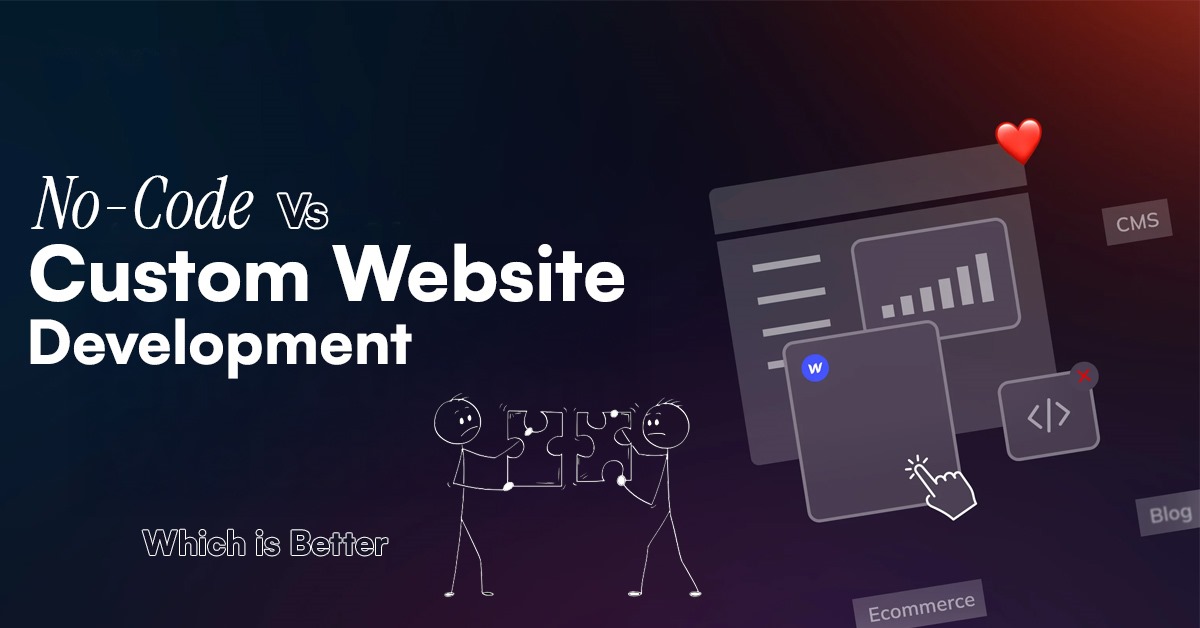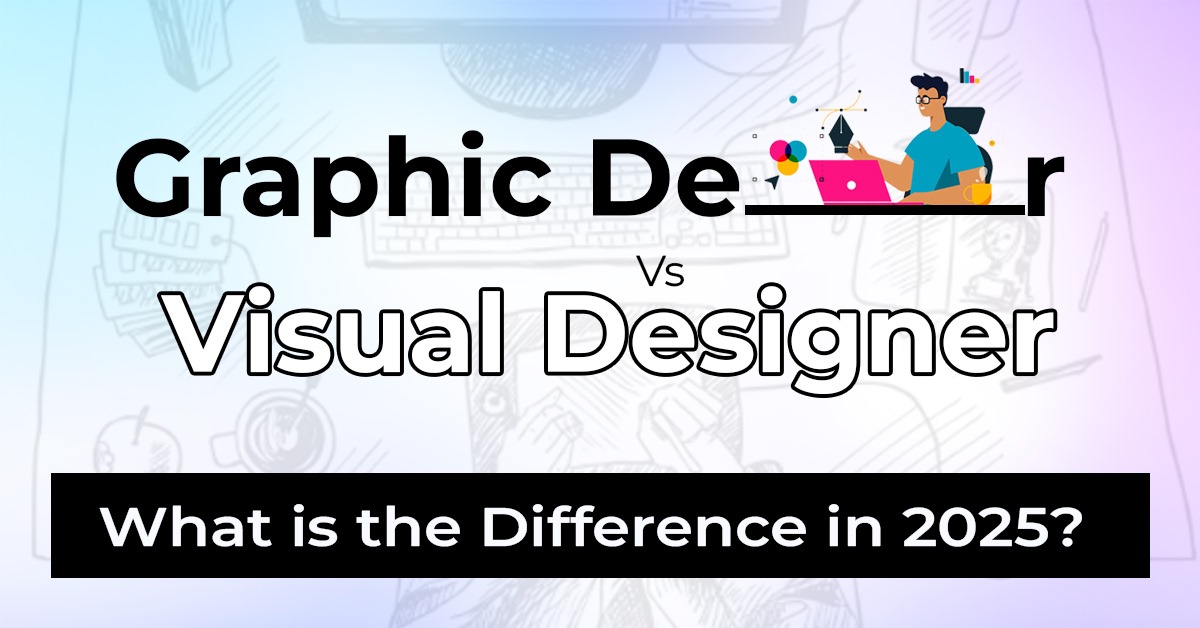Choices in favor of No-Code vs Custom Website Development can be one of the most crucial decisions made by modern business entities and entrepreneurs. Whether you are on one side or the other, a startup company launching its first product in the marketplace or an established business venturing into the digital Security firm, your performance in terms of schedule, cost, scalability and control will depend on the choice of development methodology.
In this modern busy digital world, companies have to work at a fast pace. However, rushing to do something should not imply giving up on quality. Knowing the advantages and limitations of every method ushers you in making wiser and bigger. So let us examine both two procedures and find out which one suits your interest.
What Is No-Code Website Development?
No-code A growing number of platforms enable people to create websites and applications without coding. Rather, you have visual constructors, drag-and-drop layouts, and prebuilt components. One can do this with the help of platforms such as Webflow or Bubble and Glide or Wix and become a tech-savvy person.
Accessibility is the greatest advantage of no-code. It is not necessary to have a development team or to know more about programing to run the idea in life. That is why solopreneurs, marketers, and small businesses are widely using it. It is expedient, cheap and ideal in MVPs, portfolios, and internal tools.
What Is Custom Website Development?
The opposite end of the No-Code vs Custom Website Development spectrum that we all know is classic: custom code. In this case, programmers can code their programs in such languages as HTML, CSS or JavaScript, Python or PHP to build custom web and applications. It is such an approach that provides ultimate flexibility in design, construction and expansion as necessary.
The custom development is applicable when it comes to handling intricate, high-performance applications like SaaS products, eCommerce stores, or those platforms that have large user databases. It is more time- and resource-demanding, nonetheless, it is extremely malleable and extendable and you can adjust all the details.
Benefits of No-Code Website Development
There are certain unquestionable benefits related to no-code tools, particularly, to startups and small teams. In the first place is speed, as you can be up in days (e.g. months). They have ready-made templates, hosting, and security components that reduce the time required in setting up.
They are also cost-effective since there is no need to employ either developers or have a technical workforce. The update can also be done in-the-fly, which means that iterations will be faster. In an accumulating argument of No-Code vs Custom website Development, no code takes the lead in regards to ease of use and approachability of non-technical users.
Limitations of No-Code Development
Nevertheless, no-code is not perfect. On most platforms customization is limited. There is no place to find such a feature that does not exist yet on the ecosystem of the tool. You are also bound to prices, features and performance of the platform commonly referred to as vendor lock-in.
It may not be scalable either. When your application becomes large, performance bottlenecks can be experienced, especially when it is performing complicated operations or when it is holding lots of data. Higher-ranking websites on search engines may have technical SEO capacity limitations at the final stage. The few shortcomings are the reason most businesses later shift to the custom development.
Benefits of Custom Website Development
Custom Web development can be controlled in every way. The use of templates on the platform and the use of the plugins do not limit you as to what you can utilize and create whatever is required in your business. It fits best when you have some unusual business model or when the third party integration is needed such as AI tools or API or real time systems.
Performance optimization is the other major strength. You can optimize loading times, user experience paths, and server performance since you are the only person in charge of the entire code base. Altogether, it is mostly a matter of flexibility versus speed in No-Code vs Custom Website Development. And customized coding offers utmost flexibility.
Challenges with Custom Website Development
Custom development, said, has its own set of challenges. It is costly, and, in most cases, it involves the hiring of a quality team and major time commitment. It will involve planning, testing and deployment even in small modifications.
There is also the technical dependency where non-technical founders need to depend on developers in terms of bug fixing, feature updates among others. This has the potential to hamper your rate of iteration. The next issue is maintenance since you handle hosting, security, and other technical support.
When to Choose No-Code Website Development
The no-code development is ideal when you have to act quickly and test the idea. Examples include:
- Validation of a start-up business on Minimal Viable Product (MVP)
- Planning of a marketing page or landing page of the campaigns
- Internal dashboards, or CRMs
- Making individual portfolio or mini-blog
When you are just starting out in the business world or your idea takes off rapidly, those no-code tools allow you to experiment fast without digging a hole in your finances.
When to Choose Custom Website Development
Select custom development in case your project:
- Will need complicated backend logic, or workflow Requires back-end logic or process Requires complicated back-end logics or processes
- Will be used by millions of users or operate heavy data sets
- Requires a custom user experiences and branding not part of template
- Is dependent on real time capabilities, e. g. chat, gaming, analytics
To scale and grow reliably and safely, custom-developed websites provide the high-end power and performance to large businesses or startup firms of any age or size.
No-Code vs Custom Website Development
Assessing the No-Code vs Custom Website Development, it is crucial to learn about the main peculiarities of each of them. But your decision will determine how fast or slow your site will become, how scalable it can be, how expensive it can become, whether it can grow or not in the future.
Speed
These no-code platforms help you create an app or a website in a matter of days with the help of visual tools and templates.
Custom development is time consuming often weeks or months since all the elements have to be created and tested.
Cost
No-code solutions are low to middle cost, and thus suitable to startups and small businesses.
The custom development is expensive and normally needs a talented developer or a complete agency.
Control
No-code has no backend, but the customization is condensed to what the platform provides.
Custom development makes everything under your control, allowing you to create anything you want.
Scalability
No-code instruments are effective to process small- and medium- scope work but cannot cope with rigorous logic or traffic.
The websites that are built to order are able to scale and support complex performance needs.
SEO Flexibility
Even meta titles and descriptions are the best features of no-code on most platforms.
Advanced practices of SEO can be utilized using custom websites, such as schema, quick loading code and full optimization.
Best Use Case
No-code is suited for MVPs, portfolios, landing page and inner dashboards.
Custom development works best with SaaS applications, talk eCommerce solutions and real-time, feature-rich applications
Summary
Both Custom Website Development and No-Code have their own particular advantages according to your project requirements.
No-code is ideal in terms of being expedient and cheap. Custom development prevails with flexibility, strength and expansion.
Examples of Each Approach, in Practice
We may take a few of the actual life illustrations:
No-Code: a yoga instructor makes a reservation form with Wix. One use case is non-profit. The prototype is created in Bubble by one of the startups to sell to the investors.
Custom Code: A chatbot platform is an AI that is a startup company. This is because a marketplace like Etsy requires multi-vendor logic and search and filter, which is bespoke.
Every technique becomes effective when used in the right setting. All is about selecting what is good to your level as well as vision of the business.
SEO Considerations
The aspect of SEO is usually ignored in the comparison between No-Code and Custom Website Development. Most no-code solutions do not provide access to the essential SEO features such as meta tags, structured data, or sitemaps control. That can damage good SEO traffic possibility.
Through custom development, you are able to optimize all the pages, scripts and structure. You too have access to server performance, optimization of images, URL logic and the page speed which are crucial to success in SEO. Custom code may have an obvious advantage in the case of businesses that heavily depend on search traffic.
Future of Website Development
The future is not black and white, it is hybrid. Developers are trying to merge the two strategies. As an example, a startup may start using Webflow, and as they grow they can switch to a custom code (React). This combination is not an exception.
Even the no-code tools are developing. No-code development platforms such as Bubble and Webflow have become API-enabled, allow injecting custom code, and even more complex integrations. The divide between the sides is becoming less evident, and No-Code vs Custom Website Development is no longer a matter of choices.
Which One Should You Choose?
Which one do you select No-Code or Custom Website Development? Are you a solo-founder or a small team? Don utrifeld in that case, no-code is perfect to build cheap and fast MVP. It allows you to go fast without a development team.
But in case you are developing something that is either complex or highly scalable, custom development is more flexible, has more control and can have SEO whereas open-source is limited. It is ideal in long term performance oriented projects.
Lots of businesses begin a no-code and transition to custom as the company expands. Select according to your present level and the future ambitions.




